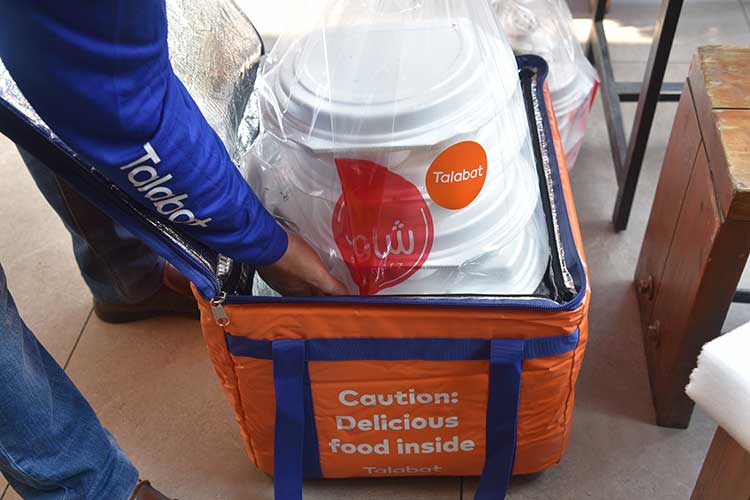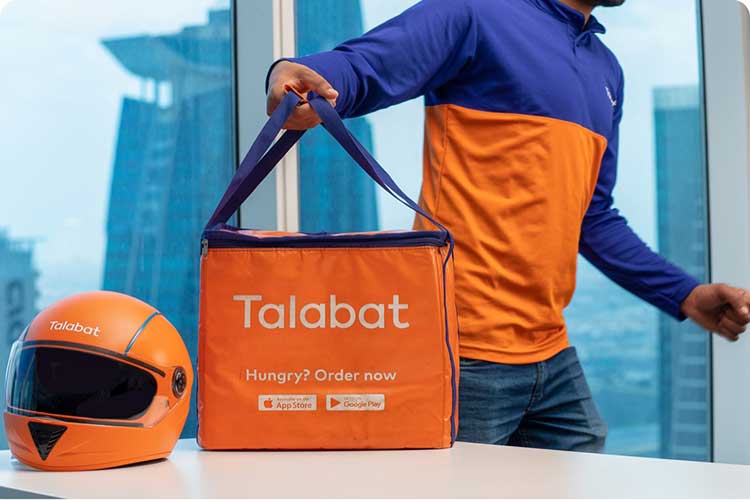
A Bachelor in Economics and a Masters in Global Marketing Communication, Tatiana Rahal started her career in NYC working on data analytics for global brands as Mazda, Visa, and Bristol Myers Squibb. After four years, she joined a top tier management consulting firm in the MENA region where she got the opportunity to work on a diverse set of projects in Berlin, Dubai and Qatar. However, wanting to follow her passion for food and technology, Tatiana decided to join Talabat in 2017 and she became Managing Director Oman in 2019. She has since successfully headed Talabat through the pandemic, ensuring the company remains operational and we receive our food and groceries on time across the country.
Please could you provide us with a brief history on Talabat and what has been the secret behind its success?
Talabat originally started in Kuwait in 2004 where it had a lot of success. We slowly started expanding in the Middle East starting in 2010 and today we operate in eight countries: the UAE, Kuwait, Saudi Arabia, Qatar, Oman, Bahrain, Egypt and Jordan. We are very proud to be the largest online food delivery platform in the Middle East and we work extremely hard to make sure our customers, partners and employees are having the best experience with us. We have amazing and hard-working local teams in each country that we rely on.
The secret to our success is a very localised strategy and local operating model, always keeping our customers as our top priority. We listen to any problem a customer might raise and try to find a solution. We are here to get better, work harder and create the best possible experience by listening to feedback in order to improve our strategy within our markets and teams.
Ever since the world has been under lockdown following the COVID-19 pandemic, there seems to have been a significant uptake in the use of online services globally, especially for e-commerce. How much of an increase have you observed for the same in the region, and Oman in particular?
That is – perhaps surprisingly – not the case! It is the biggest misconception that exists. It is correct that our sector was one of the few still operating in most markets, but what is not correct is the idea that food delivery boomed. Quite the contrary – we saw a dip in all markets – in some more than others. This is due to changing customer behaviour. Customers are looking for affordability a lot more. The office lunch has often been replaced by home cooked meals and the general behaviour of ordering food was fuelled by the office life. Now that everyone has gotten used to staying home and working remotely, the novelty of homemade food has washed off and people have started ordering their lunch or dinners again.
Could you provide us with some insight into the shopping trends of your customers and how they have shifted following the lockdown?
We have seen a drop in food orders and an increase in grocery orders. Our grocery deliveries are planned to be timely, reliable and safe, and we encourage customers to order online as our platform can fulfil all of their needs. In terms of food deliveries, Eid brought some much-needed relief for restaurants with orders picking up. We had a decrease in orders during Ramadan, however, they are now back to their normal level.

What has Talabat done to address the shifting customer trends and what policies has it implemented to ensure the safety of both its staff and customers? Do you see any of these policies or changes persisting post COVID-19?
The safety of our customers and teams is our main priority. The delivery process – groceries and food orders alike – imply a degree of closeness between our customers and riders, which is why our trained riders apply all preventive health and safety rules of social distancing and no-contact deliveries where possible. They are tested daily to check for temperature, they sanitise multiple times during every single delivery, and make sure to follow strict guidelines for contactless deliveries enabling our customers to receive orders without being in direct contact with our riders. We have been very vigilant and are very strict about these rules, and we are extremely thankful that our riders have been safe and healthy during this time. Our drivers will forever be seen as heroes as they put their lives on the line to help Talabat function normally during this pandemic and we are so thankful for their bravery.
Within the company, we provide support to all our employees and strongly encourage them to work remotely. We implemented shifts at first to make sure that our capacity was never more than what was allowed and slowly moved into remote work to keep everyone safe.
Concerning changes that will persist, I believe working remotely will remain a constant part of our lives as well as the increasingly stringent health and safety standards – much more stringent than before COVID-19.
To what extent do you expect the current situation with the pandemic to alter the industry as a whole going forward?
COVID-19 is bringing change. Some change is temporary, and some is permanent. From a commercial perspective, everyone is assessing their business viability and trying to overcome unprecedented and new challenges.
As a food and groceries delivery platform, we are finding ourselves in a unique situation where people rely on us to safely deliver food, groceries, and medicines to their homes, and restaurants need us to keep their business going. And like most businesses, our focus is on doing everything we can to ensure people are safe and healthy, as well as ensure there is business continuity during COVID-19 and beyond – for us as a company, for our riders and for our restaurant partners.

What is your vision for Talabat and what do you foresee for the delivery business as a whole?
Our main goal is to support our restaurant partners that suffered due to the COVID-19 pandemic where we can. The most important thing we have been doing for restaurants is to continue to drive growth where possible, to recover lost orders, and bring customers back.
By developing additional safety measures and features and focusing on continued safety messaging, we have been restoring customer confidence as well. In addition, we have been incentivising our customers to support local businesses by introducing location-based free deliveries. Additional campaigns and promotions are helping to further drive traffic to our partners, and these incentives and campaigns require significant investments from Talabat.
A lot of our restaurant partners have suffered and as this situation is going to go on indefinitely, we want to ensure that our business is in sync to support our partners in getting through this, whether it’s our clients, partners, or our teams and create a fantastic experience for everyone.
